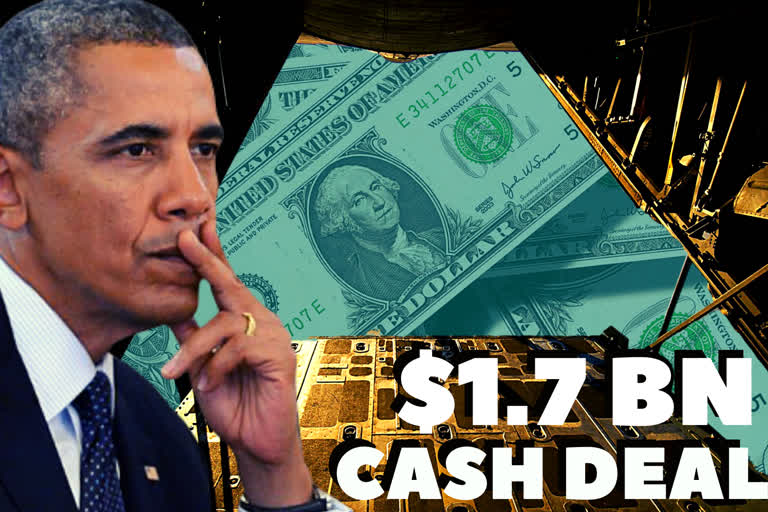Hyderabad: Set aside the pandemic that the US is passing through, it is the 'Obamagate' that US President Donald Trump tweets about day in and day out relivening the alleged mishappenings of Iran nuclear deal inked during former president Barack Obama's tenure. From television studios to various social platforms 'Obamagate' is flooded with pro- and anti-views across America.
In June 2018, Republican senators on the Permanent Subcommittee on Investigation found that the Obama administration, in fact, hid details from the Congress that it sought access for Iran. And in a hurry to seal the deal, the administration attempted to bypass sanctions that were in place post-2015 agreement.
GOP Senators have accused the Obama administration of allowing Iran to access the US financial system. In a report, the Senators have highlighted Iranian oil sales of $5.7 billion in Omanian rial that was frozen in Bank Muscat.
But the Omani bank could not violate the US sanctions that remained in place. To convert rials into dollars is difficult but as per the Iran deal, the Islamic republic was promised access to its overseas reserves that were frozen by sanctions.
Read also: 'Obamagate makes Watergate look small-time'
In an attempt to access rials, Tehran wanted to convert them briefly into dollars and later to Euros.
As if that was not enough, the US treasury at the instruction of the State Department, granted a license to convert the amount briefly into US dollars to facilitate it to be converted into euros. Not surprisingly, the Republican report termed the exchange as 'legal'.
US Treasury's Office of Foreign Assets Control's (OFAC) officials had asked two American banks to proceed as mediators to execute the transaction. But the banks declined as there might be a regulatory backlash.
Later, by proposing to bring senior officials, OFAC even worked to encourage banks, the report revealed citing an email review in the investigation.
Read also: Trump: Obama was close to a 'big war' with NKorea
To make matters worse, the report added that a Treasury official wrote in an email that authorities were examining whether Iran sanctions allow currency exchange of rials to dollars or not. However, they found that the transaction was legal.
Further, the GOP report stated that the terms of the JCPOA were "consistent with Iran's position, allowing the Government of Iran to engage in 'transfers,' 'foreign exchange (including Rial related transactions),' and the 'purchase or acquisition by the Government of Iran of US banknotes.'
The report contended that by granting the license to Iran to access US dollars, the Obama administration violated the sanctions that were put in place following the 1979 US Embassy seizure in Tehran. Key officials of the Obama administration, however, have denied that Tehran was granted access to the US financial system.
Yet, Washington ended up giving Tehran $1.7 billion. But Democrats argue that it was the payment of US weapons first instalment which Tehran purchased but Washington never delivered due to the tensions stemming from 1979 embassy takeover and the Iranian revolution.
According to the Democrats, Iran's pre-revolution government had paid $400 million to Washington for the delivery of fighter jets.
When the Obama administration was negotiating the nuclear deal and return of four US citizens with Iran in 2015, it was also simultaneously negotiating to settle the issue of $400 million.
A year later in January 2016, they sealed the deal concluding that Washington would pay $1.7 billion to the Islamic republic. The massive jump in the amount was resulted due to inflation.
As the US prisoners in Iran were released on January 17, 2016, the same day the amount was paid in instalments with $400 million being handed over to the Islamic republic.
In the next 19 days, the massive $1.3 billion amount was delivered to Tehran in cash. To this, Barack Obama said that the amount was given in cash due to the strict sanctions and Washington was not having any banking relationship with the Islamic republic.
It is this payment of $1.7 billion hard cash that the critics call “a ransom payment”, but officials of the Obama administration rubbish the charges and claim it was done to settle decades-old-dispute over the arms deal.
Iranian media reports, on the other hand, claimed that Tehran considered the cash as a ransom payment. The US House Foreign Affairs Committee Chairman Ed Royce said that "paying ransom only puts more American lives in jeopardy. We already know the Iran nuclear deal was a historic mistake. It keeps getting worse."
In the days to follow, the Obamagate is likely to snowball to a much larger controversy putting the former president in a tight spot.



